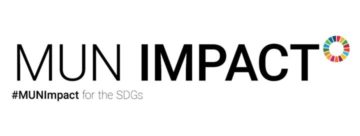Grace Makwaza, a student from Lesotho used to believe that she didn’t have the power to do anything before she joined Model United Nations. She found her purpose in Model UN as it helped her raise her voice and speak her mind. She found herself serving her community to her fullest potential.
Through this presentation, she made us realise how we as individuals can create an impact in society. Her definition for quality education is ‘an education that offers the holistic academic and mental growth of a student by moulding them into individuals that are not afraid to change the world.’
Quality education doesn’t mean achieving academic success, it also means being aware of and using the received education to bring about a positive change in one’s surroundings. She talked about how the SDG 4 affects all the other SDGs and helps in their easy implementation. It plays an important role in making students global citizens thereby opening their young minds and enabling them to question their environment and the policies enforced upon them. Schooling opens up our minds and enhances our problem-solving skills.
She addressed some problems which the youth face in their daily lives. Problems like peer pressure, lack of motivation, societal stereotypes stop the youth from using their voice. They start thinking about how others would judge them if they present them their views. In other words these problems act as a hindrance to effective communication with the society. To tackle these problems, one must never hesitate to participate in debates as they enlighten oneself with knowledge. Choosing wise peers who encourage them to break out of their shell is another way to remove these barriers.
Before participating in an MUN, her academic performance was par excellence and she had never thought of making a change as an individual. Being hungry for debate, she participated in one of the Model UN’s in her region. Model UN opened her mind and made her ponder upon global issues and how she can do something worthwhile. ‘It felt like my voice did something to shift someone else,’ she said.
The participants were curious to know as to how the less privileged communities could raise their voice and play an active role in policy making. She answered that the more privileged groups who have more power and influence should support them and encourage them to speak their minds.She added that ‘quality’ education in itself can bring them to speak up and demand justice.
She said, ‘We don’t need to be a Malala to make our voices heard. We need to be ourselves.’ We as individuals are talented in one or the other way and use different ways to express ourselves. She said that some of her friends use different mediums such as songs and dance to spread their messages and raise their voices.
To initiate action we need to be thoroughly educated about our planet and it’s beings, because our action as an individual will impact several others. Don’t hesitate to raise your voice, don’t hesitate to fight against prejudice.
